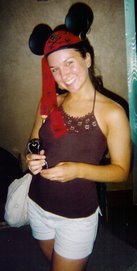What would life be like being a Down syndrome child, or having a Down syndrome child in your family? Our documentary follows the life of 3 year-old, Caitlyn, and how she influences her family every day. Raw emotion and genuine love are shown through the relationships presented in the documentary. Life may seem rough sometimes, but viewing it from a different perspective makes us all aware of the gifts that we do have.
View life from Caitlyn's perspective on Tuesday, May 8th, 2007 at 12:45 in Mueller Theater. Find out what Caitlyn May. . .
Wednesday, April 25, 2007
Saturday, April 14, 2007
Documentary Update
JAMA Productions documentary on Catelyn, a Down syndrome child, has been coming along. So far, we have interviewed Catelyn’s Mother, Father, and even her older sister a little bit. We have met with the family numerous times, and have a lot of footage of Catelyn playing and simply being herself. We also have footage of Catelyn and her sister playing and dancing together. The parents graciously loaned us some pictures of Catelyn throughout her childhood that we plan to include in the documentary. Furthermore, they have given us a CD of inspirational songs that we will most likely use as well. The family has been very open and receptive to our project.
We do have a couple things left to do though. This Monday, my group has an interview scheduled with one of the psychology professors, to get the technical information about Down syndrome. We will be asking the professor what Down syndrome is and how it affects an individual’s life, among other things.
After our last interview, my group will begin the editing process. Finally, we will start advertising for our film and eventually present it.
I feel that we are right on track with our documentary. Everyone in my group has equally participated and we work really well together as a team. It has been smooth sailing so far. Hopefully it will stay that way for the final stages of the project.
We do have a couple things left to do though. This Monday, my group has an interview scheduled with one of the psychology professors, to get the technical information about Down syndrome. We will be asking the professor what Down syndrome is and how it affects an individual’s life, among other things.
After our last interview, my group will begin the editing process. Finally, we will start advertising for our film and eventually present it.
I feel that we are right on track with our documentary. Everyone in my group has equally participated and we work really well together as a team. It has been smooth sailing so far. Hopefully it will stay that way for the final stages of the project.
Sunday, April 8, 2007
Desperate Housewives - Our reality?
 I am an avid Desperate Housewives fan. I try to never miss an episode and own the previous seasons on DVD. This Sunday, I was watching Desperate Housewives as usual, and couldn’t help but notice all of the drama that does not happen in every day life. The episode starts out with Susan meeting her fiancé’s parents for the very first time. Normally, I would simply watch the show and enjoy all of the drama that is in “their” lives, and not mine, however, this time I was noticing situations that I would not normally experience. During Susan’s meeting with the future in-laws, she accidentally sets her mother-in-law to be’s dress on fire. Not only is this situation unimaginable, but it gets even better; the mother-in-law does not get burned in the slightest! Another example from the episode on Sunday was when Susan walked in on her future father-in-law trying on her lacy undergarments and silk robe. When would this ever happen in real life? Even if the father-in-law did prefer woman clothes, would he be trying on the clothes of a person that he knew only for one sit down dinner? I doubt it.
I am an avid Desperate Housewives fan. I try to never miss an episode and own the previous seasons on DVD. This Sunday, I was watching Desperate Housewives as usual, and couldn’t help but notice all of the drama that does not happen in every day life. The episode starts out with Susan meeting her fiancé’s parents for the very first time. Normally, I would simply watch the show and enjoy all of the drama that is in “their” lives, and not mine, however, this time I was noticing situations that I would not normally experience. During Susan’s meeting with the future in-laws, she accidentally sets her mother-in-law to be’s dress on fire. Not only is this situation unimaginable, but it gets even better; the mother-in-law does not get burned in the slightest! Another example from the episode on Sunday was when Susan walked in on her future father-in-law trying on her lacy undergarments and silk robe. When would this ever happen in real life? Even if the father-in-law did prefer woman clothes, would he be trying on the clothes of a person that he knew only for one sit down dinner? I doubt it.According to Joshua Meyrowitz, television has become a negative form of entertainment, because while we are watching the lives of others, it shows us all the places we want to be, but can’t. It makes us aware that is a bigger world than simply our daily lives, and because of this, we begin to feel isolated and alone. An example of this from Desperate Housewives on Sunday, was when Gabriella was visiting a male friend and saw a closet full of designer clothes that had belonged to his ex-wife. Being a woman that loves clothes, I was a bit jealous of the beautiful garments that Gabriella was able to try on. I would never be able to afford even one of those gorgeous dresses.
Baudrillard’s take on television is another interesting one. He felt that television was a kind of hyperreality. According to Baudrillard, television dictates what in life is important, such as fashion. After viewing this “hyperreality” that we are exposed to by television, we apply these rules to our own reality. Therefore, television becomes how we model our lives. I like Baudrillard’s description of television more than Meyrowitz’s because I think that we do take what we see on television and incorporate it into our own lives. For example, the style of clothing that we see on television becomes the new fashion, no matter how ugly it may be. Tonight, while I was watching Desperate Housewives, there was one scene where Gabriella was wearing this black, trench coat-like dress, and my mother stated that it had to be the ugliest thing she had ever seen. I responded back by saying “Mom, that’s the new fashion”. That proves to me that we wear, and consider attractive, what we see on television.
Uses and Gratification theory, ties into this idea that we model our world from what we see on television. This theory states that we actively choose media (in this case television) to satisfy our needs. If your need is to be fashionable, and a style icon, you may watch Desperate Housewives, or other popular television programs. We choose what we want to watch because it suits our needs.
After watching Desperate Housewives this weekend, I realized how much of an impact primetime television has on our society. From the ugly dress that is considered fashionable, to the closest filled with designer clothes, it enables the media to tell the masses what we should like and what we shouldn’t.
Subscribe to:
Comments (Atom)

